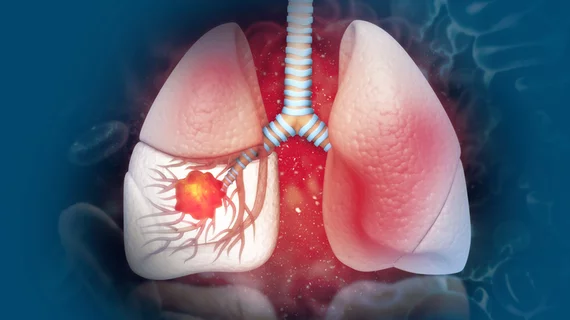Lung cancer risk increases with emphysema severity
Emphysema severity might be linked with increased risk of developing lung cancer, according to a new study published in Radiology.
The meta-analysis, which accessed three large databases to identify research that examined associations between emphysema and lung cancer, found a link between visually assessed and quantitatively assessed emphysema on CT and an individual’s odds of developing lung cancer. The odds also appeared to increase based on emphysema severity, the researchers noted.
Emphysema and lung cancer share several risk factors, not least cigarette smoking, as it increases inflammation, causes damage to the DNA and accelerates aging. However, people with no smoking history can still develop emphysema and lung cancer, which is why it is important to understand the different factors that cause these respiratory diseases to manifest.
“Other underlying mechanisms like genetic susceptibility, chronic inflammation or DNA damage and abnormal repair mechanisms, or a combination thereof, have been proposed to link emphysema and lung cancer,” study co-author Marleen Vonder, Ph.D., from the Department of Epidemiology at University Medical Center Groningen in Groningen, the Netherlands, said in a release about the results of the study.
The researchers analyzed a total of 21 studies that included more than 107,000 patients who had undergone CT assessments. Based on these scans and the patients’ histories, the experts concluded that there were measurable connections between emphysema and lung cancer. The associations were higher in the visual assessment category compared to the quantitative assessments, but Vonder suggests that the quantitative category can be fully automated and may therefore be applied more effectively in clinical care. This is something that the authors are continuing to research and validate.
“Potentially, emphysema detected on a baseline CT scan could be used to select high-risk participants who would require more frequent follow-up lung cancer screening,” Vonder said. “It is too early to conclude whether the presence of CT-defined emphysema leads to incremental and independent prognostic value over that of already known shared risk factors of emphysema and lung cancer."
Related computed tomography content:
CT colonography screening remains widely underutilized
Stratifying patients by risk of poor outcomes could reduce overtreatment of lung cancer
Disparities evident as CT stroke imaging rises sharply over 7-year period
CT scans find prone position increases lung recruitment for COVID-19 patients

